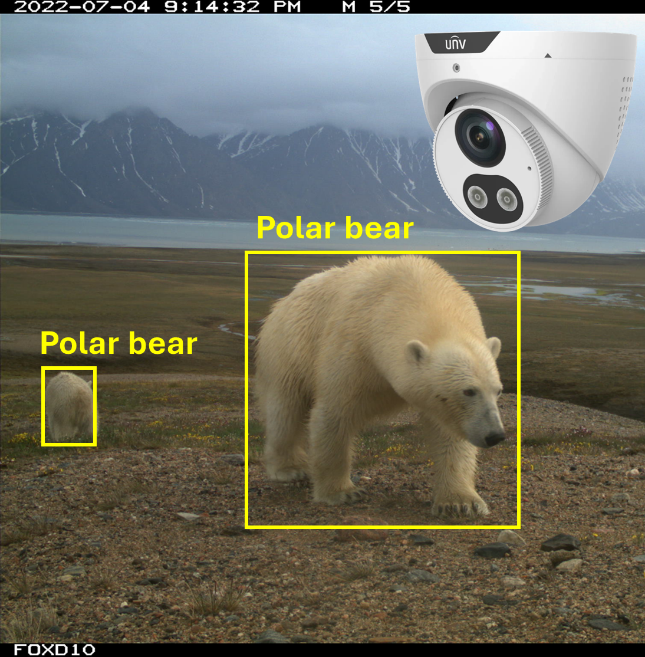Together with Kim Hendrikse and collaborators with polar bear footage, I am developing a camera based polar bear alarm: PolarBearWatch.
As human activities expand into Arctic territories, the likelihood of dangerous encounters between polar bears and people increases. To improve safety for remote Arctic research stations and communities, we are making an AI-powered polar bear detection system using advanced computer vision techniques.

Project Overview
The PolarBearWatch! system will use IP cameras to monitor areas around research stations and Arctic communities. Video streams from these cameras will be centrally processed by a single-board computer (SBC) running YOLO, a fast and accurate object detection model. The system will analyze the footage in real-time, identifying polar bear activity and sending immediate alerts and activate alarms to reduce the risk of surprise encounters.
Designed to withstand harsh Arctic conditions, the automated system will enhance the safety of personnel and residents, providing critical early warnings. It may also save the lives of polar bears as they can hopefully be scared away before causing too much trouble.
Dataset Creation, Synthesized Data, and Zoo Testing
A central part of PolarBearWatch! is building a publicly available dataset of polar bear images from diverse locations, hosted on Lila BC. Footage of polar bears in inhabited areas is limited, so we will explore using synthesized data to simulate these encounters. Additionally, we will collaborate with zoos to collect footage of polar bears and test the detection system, allowing us to refine the AI model and alerting algorithms in controlled environments before deployment in the Arctic.
Model Training and Technology
We will train custom YOLO models on a diverse dataset, including real and synthesized images, to ensure reliable performance across Arctic landscapes such as tundra with and without snow. YOLO's real-time detection capability makes it an ideal choice for this task. Testing in zoos will further validate the system’s effectiveness, ensuring it performs well in different conditions before field use.
Impact and Vision
PolarBearWatch! will reduce the risk of human-polar bear encounters, protecting both people and wildlife. By sharing our polar bear image dataset openly, we hope to drive further research in wildlife monitoring and AI-based conservation. Our use of synthesized data and zoo testing will ensure the system is robust, adaptable, and ready to improve safety in Arctic environments.
If anyone has polar bear footage and would like to contribute to the dataset or if you have ideas for test sites, please let me know!
23 October 2024 7:27am
I did a short presentation on our work with the polar bear alarm in the Wildlabs Variety Hour October 30th.
It can be found here : https://www.youtube.com/watch?v=zr2Q8bUJZ8U








Lars Holst Hansen
Aarhus University